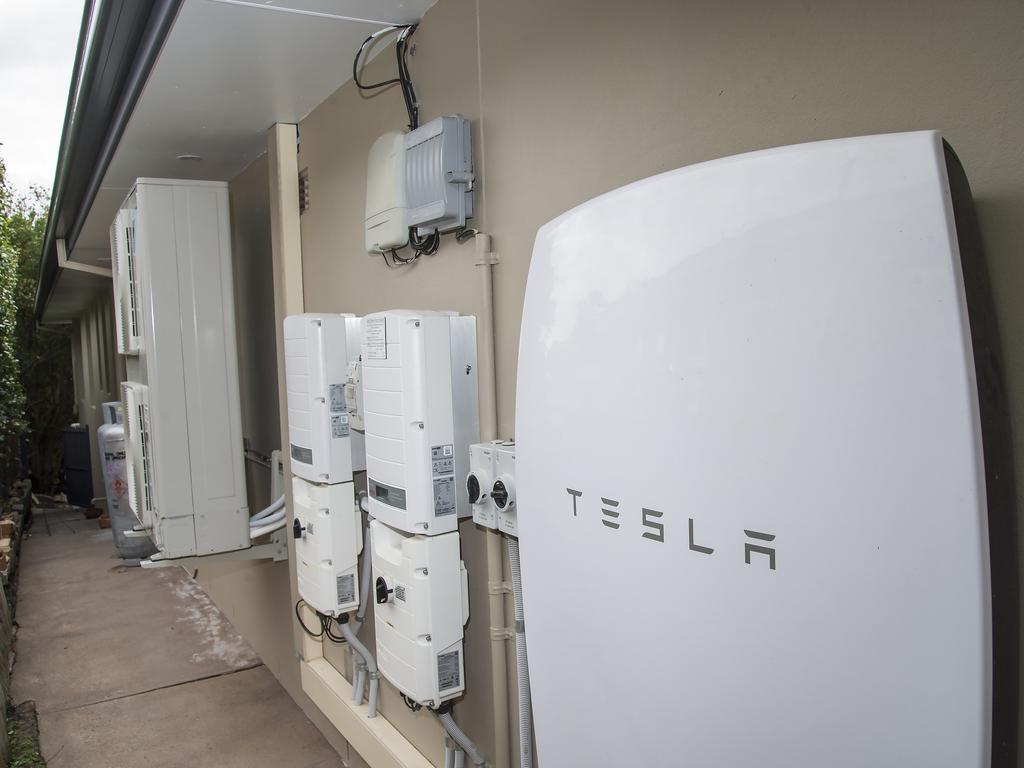Home batteries: Call for government subsidies as energy costs spiral
A majority of Aussies say they support subsidies for home batteries – but experts are divided. Vote and have your say.
A majority of Australians support the idea of federal government subsidies for home batteries, but experts differ as to whether these incentives would reduce or actually increase power bills for other consumers.
With electricity prices forecast to jump by more than 56 per cent over the next two years, the Federal Government is under increasing pressure to act on the spiralling costs, with the issue set to dominate a meeting of state energy ministers on Thursday.
While the proportion of Aussie homes with solar panels is significant (more than 40 per cent in Queensland and South Australia), the percentage with battery storage systems is much lower. Earlier this year it was estimated just 130,000 Aussie homes had home batteries.
Heidi Lee Douglas, National Director of the group Solar Citizens, said cost was a huge barrier for people to purchase home battery systems. The smallest units cost around $5000.

A survey of more than 2000 Australians conducted by U Comm for Solar Citizens found huge support – 78 per cent – for Federal Government subsidies for home battery storage.
Nearly one in two (48 per cent) said they would consider installing household solar or battery storage if they could access a government-provided no-interest loan, as is currently the case in the ACT.
“The Federal Government can address this issue by expanding the national Small-Scale Renewable Energy Scheme to also include support for people to install household storage, while also providing no-interest loans for people to invest in clean technology,” Ms Douglas said.
“Incentivising more battery storage is a win-win that brings down costs for all consumers by reducing electricity prices during peak times while also reducing the need for grid upgrades.”
But energy policy expert Alison Reeve from the Grattan Institute differed, saying subsidies for home batteries could actually increase power bills for other consumers.
“The current Small-Scale Renewable Energy Scheme … requires energy retailers to make payments to people who install rooftop solar on their house,” she said.


“The cost of this subsidy is passed on to all energy consumers. That is, consumers without solar subsidise those who have it. Currently this cost is quite small – around $55 per retail customer per year, according to the Australian Energy Market Commission. Expanding the scheme to include batteries would increase this cost – at a time when the cost of electricity is also rising,” Ms Reeve said.
The Clean Energy Council has called for the government to do more to incentivise the take-up of home batteries, but has stopped short of demanding subsidies.
On Tuesday, Climate Change and Energy Minister Chris Bowen said he would be providing “an important update on capacity for renewable energy” at Thursday’s meeting of energy ministers but did not go into detail.
The Solar Citizens survey comes as the Federal Government launches a new free online solar savings calculator, designed in conjunction with the University of New South Wales and the Australian PV Institute.
The SunSPOT tool provides guidance on the ideal solar panel and battery set ups for homes and small businesses, showing the costs and savings of different battery sizes.
“Householders no longer need to depend on salespeople to educate them,” said SunSPOT Project Leader Dr Mike Roberts.
“With this latest version of SunSPOT, everyone can get reliable tailored answers to common questions about solar and batteries.”
More Coverage
Originally published as Home batteries: Call for government subsidies as energy costs spiral




